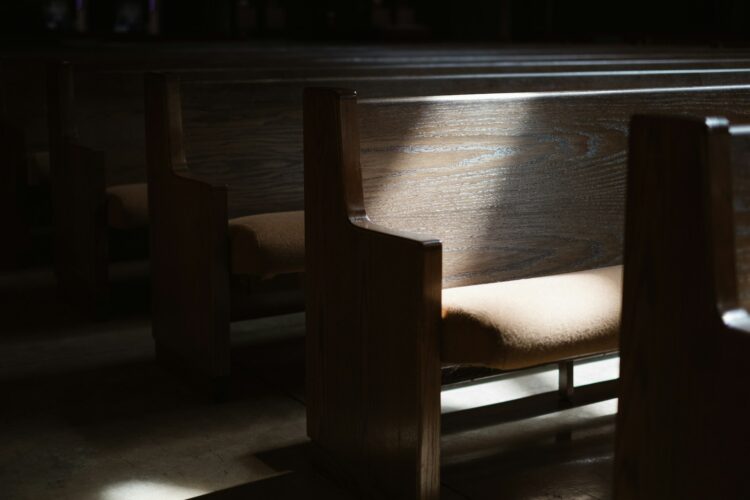
Faith rarely disappears in a single dramatic moment. More often, it fades slowly, with small changes that don’t seem like much at first. People may still go to church, bow their heads, and say the right words, but deep down, something feels different. They might not want to admit it — to others or themselves — so they cover it up. These signs can hint that someone’s struggling more than they let on.
They Avoid Deep Spiritual Conversations

When talk turns personal — “How’s your walk with God?” — they deflect. They’ll steer the conversation toward church events, community projects, or someone else’s journey. They might smile and nod when others share openly, but they won’t offer much about their own faith. The avoidance isn’t always obvious; it’s in the way they give short answers or change topics before you can ask more.
Their Prayer Life Quietly Slips

In group settings, they’ll still bow their head, maybe even speak out loud, but at home, prayer has become rare. If they pray at all, it’s rushed — a quick sentence before bed, something said out of habit rather than connection. When they talk about prayer, it’s often in terms of what they “used to” feel, as if the present can’t match the past.
Church Attendance Becomes Sporadic

They may not vanish completely, but the consistency is gone. A week missed here, another there, until it’s more absence than presence. Their reasons sound reasonable — work, kids’ activities, needing rest — but you start to notice they rarely make up for the missed Sundays. Big holidays or events still bring them in, but the weekly rhythm isn’t there anymore.
They Step Back From Serving

Serving was once part of their routine, but now they’ve stepped away quietly. There’s no big announcement, just a slow fade from the sign-up sheets. When asked, they say they need a break, but months pass without them returning. Without that hands-on involvement, they lose one of the main ways they used to feel connected.
Worship Feels Awkward for Them

During singing, they might hold the hymnal but not look at the words. They stand with everyone else but keep their voice low or silent. Their eyes wander — maybe to the ceiling, the band, or their phone. It’s not always defiance; sometimes it’s just that worship feels unfamiliar when the emotion behind it has faded. They’re there, but they’re not really in it.
Their Bible Gathers Dust

They still own one, maybe even carry it to church, but it stays closed most of the week. If asked about a verse, they’ll share something familiar from long ago rather than something they’ve read recently. Bible study groups become easier to skip. Even devotionals feel like one more thing on a list they don’t have energy for.
Their Language Subtly Changes

Phrases that once came naturally — “God’s blessed me” or “I’ll pray about it” — get replaced with “I’m lucky” or “We’ll see what happens.” They might still talk about values, but without explicitly tying them to faith. It’s not that they’ve stopped believing entirely; it’s that they’re speaking in a way that doesn’t require them to declare it.
They Dodge Personal Questions About Belief

Ask directly, “How’s your faith these days?” and they’ll give a vague answer: “You know, it’s been busy,” or “I’m working on some things.” They may laugh it off or turn the question back to you. The point is to avoid revealing too much — not because they want to lie, but because they’re not ready to unpack what’s really going on.
They Struggle to Engage With Sermons

Even if they’re sitting in the pew, their attention drifts. They glance at the clock, scroll their phone, or watch the people around them more than the pastor. They don’t discuss the message afterward like they used to. When something does catch their attention, it’s more about the speaker’s style or a funny story than the core spiritual point.
They Rely on Habit Instead of Heart

They still bow their head when others do, still stand and sit at the right times, and still shake hands during the greeting. But it’s muscle memory now, not conviction. The motions keep them from standing out, but the meaning behind them has thinned. They’re blending in, hoping no one notices the difference between being present and being engaged.
They React Coolly to Spiritual Encouragement

When someone shares a verse or says, “I’m praying for you,” their response is polite but distant — “Thanks, that’s nice of you.” They might smile, but there’s no warmth in it. Encouragement that once made them light up now seems to pass over them without landing. Sometimes, it even makes them uncomfortable, though they’d never say so out loud.
They Keep Their Doubts Private

Even if questions are eating at them, they won’t voice them in the open. They may fear disappointing people or worry they’ll be pressured into a conversation they’re not ready for. So they keep their doubts tucked away, only letting them show in small, indirect ways — a sigh during a sermon, a pause before answering a spiritual question.
They Shift Their Influences Elsewhere

The books, podcasts, and music they once loved for their spiritual depth start to change. They recommend things that have no faith connection, filling their free time with content that doesn’t challenge or nurture belief. It’s not always deliberate — sometimes it’s just easier to avoid reminders of something they’re struggling with.
They Keep Themselves Constantly Busy

Extra work hours, new hobbies, full weekends — anything to fill the quiet. Where they once valued stillness with God, now they avoid it. Busyness becomes a shield, keeping them from moments where they’d have to think about where they stand. From the outside, it looks like productivity; on the inside, it’s distraction.
They Maintain Appearances for the Big Moments

Weddings, baptisms, Christmas Eve — they’ll be there, smiling, greeting people like always. It’s easier to show up on the days that matter publicly than to explain why they’re missing. To casual observers, nothing seems wrong, but the depth of connection they once had to these events is gone. They’re showing up for tradition, not conviction.

